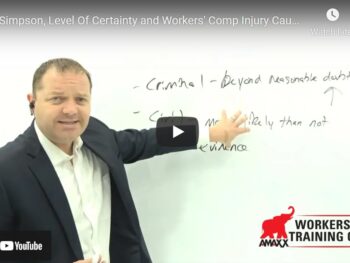We recently learned some sad news that one of our long-time contributors to Workers’ Comp Roundup, Attorney Ted Ronca, has passed away due to health complications. Ted was a wealth of knowledge in representing employers in workers’ compensation and a frequently used legal resource for questions and clarification by our primary blog writers, Michael Stack and Rebecca Shafer.
We pay a tribute to him with a compilation of some of this extensive writings. Because his library of articles is so large, and the information so valuable, we have broken it into 3 parts. Employers are recommended to use this information as a reference for workers’ compensation defense best practices.
Part 2 of 3:
Deny Work Comp Claims From Disallowed Unemployment
Can a worker who files a claim for unemployment and loses because of a justifiable dismissal then file for workers comp? Yes. And it happens all the time. The danger for employers is that the existence of the unemployment claim is not automatically known to the carrier or the New York Workers Comp board, causing many comp claims that could be defeated to be allowed at great expense, ultimately, to the employer.
Investigating Work Comp Fraud: Concealed Working Off The Books
If an employer has, say, a hundred or more workers who are semi-skilled, sooner or later there will be a comp claim in which suspicion grows that the worker has healed but is working off the books. This is a common problem in large metropolitan areas where activity is more easily concealed.
Injured Worker’s Personal Problems Lead To Dangerous Workers Comp Claims
There are classes of comp claims that start as ordinary reports of injury but quickly turn into claims nightmares. Among these is the younger worker claim in which an otherwise healthy person develops an inexplicably complicated claim. An explanation that needs to be considered is “trouble at home leads to trouble at work”.
‘See Attached’ Is Best Way To Complete First Report of Injury
The employer’s first report of a possible accident can be a dangerous trap when dubious claims are being reported. This is due to the fact that first injury forms are not designed to capture the information necessary to make decisions which are critical in the first days following an accident report. The decisions can be triaged into categories: there has been a clearly compensable accident, there has not been a work related accident, there has been a report which requires further investigation. (The second, there has been no compensable accident, also requires further investigation to document reasons for an objection.)
Defense In Depth On Work Comp Claims: The Employer’s Role
“Defense in depth” is a principal from conflict theory which promotes using several defenses in coordination instead of seeing them as separate defenses to be used one at a time. Sometimes, the phrase “mutually supporting” is used. In work comp hearings, defense issues often are identified and documented but they are not processed so that the use in hearings is enhanced.
Author: Attorney Theodore Ronca was a lawyer from Aquebogue, NY. He was a frequent writer and speaker, and represented employers in the areas of workers’ compensation, Social Security disability, employee disability plans and subrogation for over 30 years.























I love this approach! Workers Compensation can be very complex process but the tips you mentioned make it easier to comprehend. Thanks for sharing!